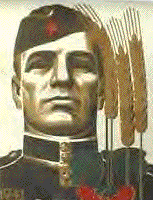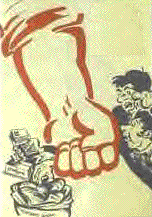 |
The proletariat is that class in society which lives entirely from the sale of its labor and does not draw profit from any kind of capital; whose weal and woe, whose life and death, whose sole existence depends on the demand for labor -- hence, on the changing state of business, on the vagaries of unbridled competition. The proletariat, or the class of proletarians, is, in a word, the working class of the 19th century. (1847).
|
 |
Modern Socialism is, in its essence, the direct product of the recognition, on the one hand, of the class antagonisms existing in the society of today between proprietors and non-proprietors, between capitalists and wage-workers; on the other hand, of the anarchy existing in production. (1880).
|
 |
Political economy came into being as a natural result of the expansion of trade, and with its appearance elementary, unscientific huckstering was replaced by a developed system of licensed fraud, an entire science of enrichment. This political economy or science of enrichment born of the merchants' mutual envy and greed, bears on its brow the mark of the most detestable selfishness. (1843).
|
 |
Authority, in the sense in which the word is used here, means: the imposition of the will of another upon ours; on the other hand, authority presupposes subordination. Now, since these two words sound bad, and the relationship which they represent is disagreeable to the subordinated party, the question is to ascertain whether there is any way of dispensing with it, ... , and would consequently have to disappear. (1872).
|
 |
As the 1870s drew to a close, the temporary peace between the English classes grew shakey. The Great Depression of the 1870s swept the western world and was, as always, particularly rough on the proletariat. The capitalist cycle downturn set in motion familiar attacks by the capitalist class against what reformist compromises within the capitalist system existed. (1881).
|